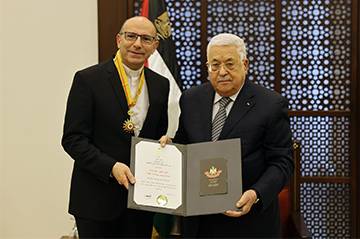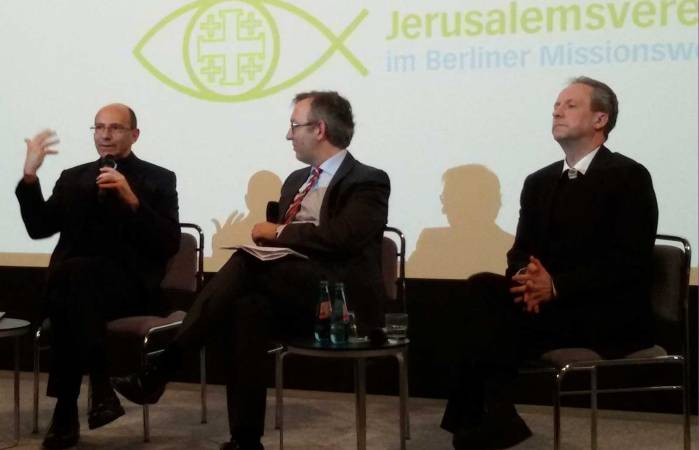Dr. Raheb's sermon at Duke Chapel

The Cross and the unexpected revelation
Mark 15
It was nine o’clock in the morning when they crucified him. 26 The inscription of the charge against him read, “The King of the Jews.” 27 And with him they crucified two bandits, one on his right and one on his left.[e] 29 Those who passed by derided[f] him, shaking their heads and saying, “Aha! You who would destroy the temple and build it in three days, 30 save yourself, and come down from the cross!” 31 In the same way the chief priests, along with the scribes, were also mocking him among themselves and saying, “He saved others; he cannot save himself. 32 Let the Messiah,[g] the King of Israel, come down from the cross now, so that we may see and believe.” Those who were crucified with him also taunted him.
33 When it was noon, darkness came over the whole land[h] until three in the afternoon. 34 At three o’clock Jesus cried out with a loud voice, “Eloi, Eloi, lema sabachthani?” which means, “My God, my God, why have you forsaken me?”[i] 35 When some of the bystanders heard it, they said, “Listen, he is calling for Elijah.” 36 And someone ran, filled a sponge with sour wine, put it on a stick, and gave it to him to drink, saying, “Wait, let us see whether Elijah will come to take him down.” 37 Then Jesus gave a loud cry and breathed his last. 38 And the curtain of the temple was torn in two, from top to bottom. 39 Now when the centurion, who stood facing him, saw that in this way he[j] breathed his last, he said, “Truly this man was God’s Son!”[k]
The Bible is a Middle Eastern product. The Bible did not originate in the Bible belt, but in the Middle East. The message of the cross is a Palestinian message per excellence.
What is so special about Palestine is that it has been a country under imperial occupation over and over again. All the Regional empires occupied our country. By their very nature, empires raise the question about God. They behave like God: they’re omnipotent; they produce, own, and operate the latest inventions in military sophistication; they can dictate their conditions and no one can object. In a victorious and mocking tone they pose the question to those they conquer: “Where is your God?” (Psalm 42:10).
People feeling the Heat of the empire, its oppression, its occupation, its military power, can’t Help but pass the question on to Heaven, asking, “God, where are you?”
It’s a three thousand-year-old lament inhabitants of Palestine—Jewish, Christian, and Muslim—have passed on from one generation to the next. It is a question that echoes throughout the Bible. It is a question of a people whose faith is continually tested. They question neither the existence of God nor his care, but they do wonder why He’s not moving. He sees his people being oppressed, He knows how they are being treated, and yet He seems to be so silent. The cry is supposed to shake him so that He awakes, acts, and delivers.
I’ve lived under Israeli occupation almost all of my life, going through ten wars in less than fifty-five years. I’ve seen people work hard to build homes and lives, only to see them repeatedly destroyed; I’ve seen dreams suffocating under the Israeli occupation. I can’t Help but ask once more, “God, where are you?”
This year marks the 100 anniversary for the Balfour declaration, 50 years of the Israel occupation of the WB, Gaza Strip. There was a time when I thought I will experience freedom and peace during my life time, now I'm not sure anymore. Will my two daughters live to see that day, I'm not sure and so we cry out how long o lord? How long?
Yet throughout the Bible—with the exception of the Exodus—the God in whom the people of Palestine put their faith appears to be silent. He sees the Assyrians resettling his people and does nothing; He watches the Babylonians desecrate his temple, and He doesn't move an inch; his capital is destroyed by the Romans, and He appears not to care. Even When His only beloved son hangs on the cross, He is “absconditus”; more than absent, God seems almost in hiding.
This has been the experience of the people of Palestine throughout history regardless of religious affiliation. In 614 CE, When the Persians destroyed over three thousand churches in Palestine and left little save the Church of the Nativity, God did nothing to push the invaders back. When the Crusaders plundered churches in the Holy Land, God did not move a finger. When Palestinians were driven out of their homes in 1948 in what we call the Nakbah, the “catastrophe,” God was silent. When the Church of the Nativity was besieged in 2002, God did not interfere. And as tens of thousands of Christians flee the Middle East for their lives today, neither God nor the so-called Christian world seems to do anything. The God in which the people of Palestine put their faith seems to be weak and not up to the challenge. Like his people, He appears to have neither the means nor the resources to confront the occupying empires. And so the old question still echoes today, “God, where are You?”
It is not by chance that the divine revelation took place in Palestine. The revelation wasn't the notion that there is a God somewhere and after all, but biblical revelation was the response to that perennial question, “Where are you, God?” The people of Palestine, our forefathers and foremothers had a special revelation, they discovered a unique and surprising answer, and the response to it made history.
God was visible and omnipresent in the grand shrines and temples of the empire. The God of the empire was as omnipotent as the empire. Indeed, his power and that of the empire were almost interchangeable. He was a victorious God—the perfect match for a victorious empire.
On the other hand, there was the God of the people of Palestine whose tiny territory resembled a corridor in Middle Eastern geography. His country lacked resources and power. Above all, this God appeared to be weak compared with other gods. He seemed forever to be on the losing end, just like his people. This God, too, was almost interchangeable with his people, his weakness was shown in theirs and their defeat was his. This God was a loser. He lost almost all wars and his people paid the price of those defeats. In short, God did not appear to be up to the challenge of the various occupying empires.
But the people of Palestine received a revelation that enabled them to spot God where no one else could see him, and to find him in the most unexpected places. When his people were driven as slaves into Babylon, they witnessed him packing up and accompanying them. When his capital, Jerusalem, was destroyed and his temple plundered, He appeared to them in the ashes. When His people were defeated, He was also present. The salient feature of this God was that He didn’t run away when His people faced their destiny, but remained with them, showing solidarity and choosing to share their destiny.
The climax of the New Testament could not have been anything else but God on the cross. Consequently and ultimately, Jesus revealed none other than this God on the Cross, in a situation of terrible agony, and pain, brutally crushed by the empire and hanging like a rebellious freedom fighter. The cross became the ultimate unexpected place for God’s revelation. The people of Palestine could then say with great certainty: “For we do not have a high priest who is unable to sympathize with our weaknesses, but we have one who has been tempted in every way, just as we, just as we" (Heb 4:15).
For the people of Palestine, the fact that God revealed himself in the most unexpected place of Palestine meant that defeat in the face of the empire was not an ultimate defeat. It meant that after the country was devastated by the Babylonians, when everything seemed to be lost, a new beginning was possible. Even when the dwelling place of God was destroyed, God survived that destruction; developing in response a dwelling that was indestructible. Ultimately, when Jesus cried on the cross, “My God, my God, why have you forsaken me?” that soul-rending plea was just the prelude to the resurrection (Mark 15:34).
The revelation made in Palestine was that God was to be found in the most unexpected places and where no one expected him.
This revelation was and is of utmost importance. For it enabled the people of Palestine to survive all defeats. It made the defeat lose its teeth, death lose its sting, and empire lose its victory. It ensured that empires were incapable of celebrating their victories, because while they crushed the people they occupied, they weren't able to crush their spirit.
This is precisely what this revelation did for the people of Palestine. It helped them not surrender after each defeat, but to pick themselves up and start over again. It made them develop an art of resilience to survive extremist empires, “hard pressed on every side, but not crushed; perplexed, but not in despair; persecuted, but not abandoned; struck down, but not destroyed” (2 Cor 4:8-9).
Palestine was the unexpected place for God to reveal himself. The cross became the symbol for Palestinian identity. The ultimate revelation on the cross shows that there is no place on earth, in history, in one’s own life where God cannot reveal himself. He is there where no one expects him, there even when we do not count on him, there when hope seems lost forever. The good news proclaimed on the cross was and is this: Expect God in the most unexpected places.



